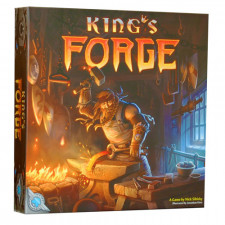King's Forge Review
on Mar 8, 2016
Describing King’s Forge in gaming terms is difficult. It isn’t a worker placement game, except where it is a little bit. You’re not really drafting, but in a way you kind of are. It isn’t a total dice based luck fest, but you’re definitely going to need to roll decently a few times. It’d be easy to overlook this game among the multitude of titles competing for time on your table, but you shouldn't. Nick Sibicky took a little of this and a little of that until he forged something very different out of many familiar pieces.
King’s Forge is a game of crafting. At the beginning of the game you’ll reveal a set of wondrous magical items that the King is looking for that will eventually be crafted by rolling the appropriate numbers on a pile of dice. The items don’t have values per se, but they’re arranged by number from low to high so that the items require more valuable dice, or better rolls on those dice, as the game goes on. You start the game, like many games, with a pile of basic resources. These plain black metal dice are used throughout the game in crafting, but you aren’t going to get too far with them. To craft the most amazing items available, you’re going to need to convert those metal dice into various other resources like wood, gems, or magic.
The conversion process is the heart of the game. Each game of King’s Forge is played with a different set of Gather cards. They do things like convert a couple metal die into a wood die, give you some bonuses during the craft phase, or maybe give you a magic die if you’re willing to trash a number of lesser dice to get it. While only 3 items are available to craft during any given round, all the items available for the game are visible from the start. This means you know exactly how many items that use Gems are coming up, and how many Gem dice you need to acquire. A claimed Gather card can’t be used by your opponents until the next round, so denial is often a consideration in your choice. Depending on how many Gem producing gather cards you’ve got, it may be possible to choke your opponents out of the late game items.
At first it seems like having that information would make the game easy and predictable, but it doesn’t. A huge part of King’s Forge is timing. Your dice are your resources, and while trashing 3 metal dice to get a Gem die may be necessary...if you do it too early you’re going to be stuck with a limited selection of dice before you can actually use it. If you decide to take advantage of some efficient gather cards and snag valuable dice so you’re ready for the later items, your opponents might be patient and delay crafting the early stuff while they build a large stockpile of dice and win behind a couple of power turns. Conversely, craft too early and you’ll fall behind. It means nothing to craft the first three items means if you can’t grab the fourth one because you fell behind in dice gathering.
You see, any dice used for gathering can’t be used later in the round Crafting. If you want to Craft you’re going to have to pass your turn early and watch your opponents snatch up those gather cards and build up a shiny pile of dice to use later. It creates great little opportunities to press your luck. Maybe you’ve got the dice you need to craft a Dragon Whistle, but decide to give it another round because it doesn’t look like anyone is going to craft it. Perhaps you decide to pass because you have more green dice than your opponents, only to watch them buy up the dice modification abilities. Timing is critical, and it can give the game a sort of nervous tension as you try to predict what your opponents are doing knowing you all have the same goals.
>Crafting is where the rolling comes in. A basic sword might require rolling at least a “3†on three different black dice, but a high-level magic crown will need “6â€s on four different blue Magic dice. There are ways to modify your rolls of course, but they often come at the steep cost of trashing your hard earned dice. You really need those dice because your opponents can steal those items from you the round you craft them if they can roll better than you did. This small little mechanic is what elevates King’s Forge above the 100s of games competing in this class of game. It puts a sharp edge on all of the resource conversion, luck pushing, and the choices you make. It isn’t enough to be good enough, you have to be better and you have to better right now.
This all comes together into a sneakily good gaming experience. Like its mesh of mechanics, each game is a little bit familiar yet surprisingly different. It’s easy enough to teach to new gamers, but the game has enough legs for gamers to play repeatedly. Everyone needs a go-to game that can be played with new gamers and old gamers that can be made the main event or used to wind a night down. King’s Forge is quickly becoming my go-to game.

 Customer Support
Customer Support  Subscribe
Subscribe 




 Account
Account  Wishlist
Wishlist 

